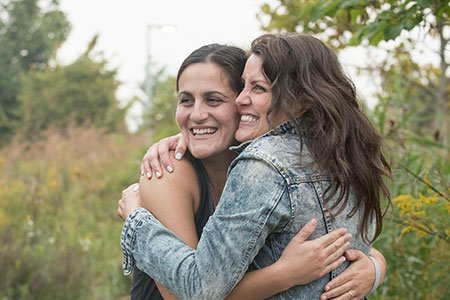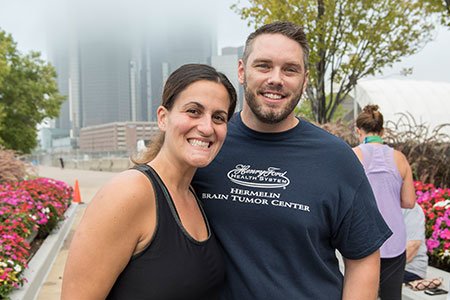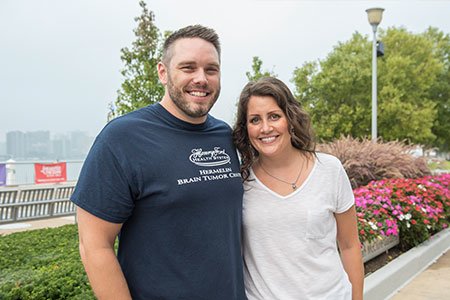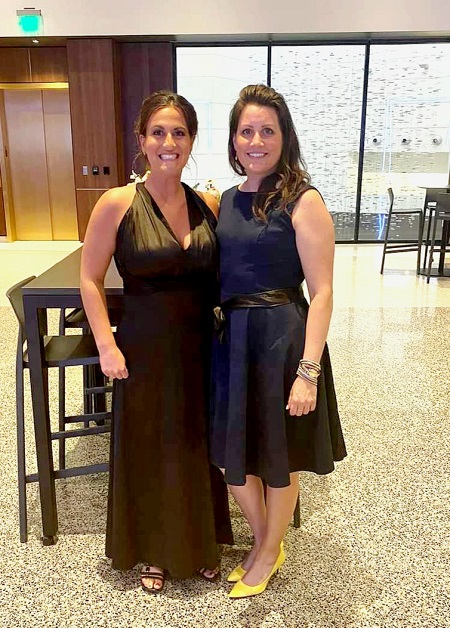Danielle and Sasha Beat the Odds Celebrating Over a Decade Cancer Free from Glioblastoma

In the spring of 2009, Danielle Gillespie’s life was full of new beginnings. At that time, the 20-year-old Saline resident had recently given birth to her oldest daughter Juliana, and was planning her wedding. That May, she started a nursing program at the University of Detroit Mercy. But on the second day of the program, while carpooling with a pair of fellow students, she suffered a seizure. She woke up to the paramedics taking her out of the car. The cause? A cancerous, golf-ball sized tumor on the right side of her brain known as a glioblastoma.
“Most glioblastomas are found in men over the age of 60,” Danielle says. “So the doctors were surprised to find I had it.”
The next day, Danielle visited Henry Ford Hospital in Detroit where she met Neuro-Oncologist and Medical Director of the Precision Medicine Program at Henry Ford Health, Dr. Tom Mikkelsen, Neurosurgeon Dr. Konstantin Elisevich and Dr. Steven Kalkanis. The team began mapping out a plan to remove Danielle’s tumor and develop a path to recovery.
Despite statistics estimating less than one percent of glioblastoma patients survive 10 years or longer, Danielle says, her Henry Ford doctors were optimistic about her prognosis, urging her not to consider any of the statistics surrounding young people and the survival rate for glioblastomas.

Dr. Mikkelsen says while it is indeed rare for 16-year survival, it’s not impossible. “We are studying these 'exceptional responders' and are getting better about how we can more accurately prognosticate when they are first diagnosed” he says. “This helps us both relieve those with good factors to not be terribly burdened by the overall statistics as well as to double down on research for those truly refractory cases, so that more folks are living better.”
Doctors at Henry Ford Health also informed Danielle that she had other personal factors working in her favor, too.
“They told me ‘You have three unique things going for you: You’re young, you’re female and [after the surgery was over] your tumor is sitting in a bucket.”
While Danielle’s diagnosis was indeed rare (and her surgery was a success), she wasn’t quite as unique as she thought. In fact, another young woman had recently come to Henry Ford for glioblastoma treatment and was already six weeks in to the healing process.
Sasha’s Story
Bloomfield Hills resident Sasha Archer was 28 years old when she arrived at Henry Ford West Bloomfield Hospital to have her glioblastoma removed. Like Danielle, her life prior to the diagnosis was packed with activity. She was juggling two jobs (one as a system specialist for Konica Minolta and one as a bartender) and she’d recently started traveling to and from California to see a man she’d been dating.
Unlike Danielle, however, Sasha was living alone when she started exhibiting symptoms of a brain tumor. One morning in February 2009, she woke up in a sweat and couldn’t make it into work. Her boss called to ask where she was, and she hung up on him. The next day, while in the office, her coworkers noticed that her behavior was off.
“My personality was there, but it was so different in certain ways that everyone thought I was on drugs,” Sasha says.

A few days later, while working her bartending job in Southfield, Sasha’s coworkers took her to the hospital after recognizing that she couldn’t manage basic tasks like how to make drinks. Doctors diagnosed her with a grade IV glioblastoma in her left frontal lobe. Two weeks later, Sasha was admitted to Henry Ford West Bloomfield Hospital where neurosurgeon Dr. Ghaus Malik and oncologist Dr. Thomas Doyle teamed up to address her case.
“It was a pretty traumatic experience,” Sasha says. “But when there’s a big obstacle, I’m going to get through it. There is no other option. That’s just my personality.”
Dr. Malik, Sasha’s neurosurgeon, recalls how this was the first brain tumor surgery performed at Henry Ford West Bloomfield Hospital. “When I asked her if she was comfortable being the first patient having brain surgery in a hospital just opened one day earlier, her response was ‘If you are comfortable doing the surgery, why should I be concerned?’” “She is an amazing woman,” he says.

Six weeks into her recovery, which involved several weeks of chemotherapy and a variety of medications, one of Sasha’s nurses informed her that another young woman had come to Henry Ford for brain tumor treatment and asked if she would be willing to connect with her.
“I said ‘Of course!” Sasha says. “I’m happy to talk to anyone!”
Danielle and Sasha connected over the phone and started sharing stories about their experiences. They discussed the side effects of chemotherapy, their concerns about fertility and how coincidental it was that the two of them were diagnosed so closely together.
Additionally, both of them were participating in the same clinical trial program. In a trial for a medication called cilengitide, both women received the standard of care (meaning they did not receive the new trial medication).
“It was comforting for me to talk to somebody who knew the things I was talking about,” Sasha says.

Danielle, too, was thrilled to have someone help her navigate her diagnosis, the clinical trial and her healing process.
“When you’re diagnosed with something like brain cancer, chances are, you don’t know what chemo and radiation are like,” Danielle says. “I didn’t know anybody in my immediate family who dealt with that, so I was grateful to have somebody to talk to who had been there before. Sasha really showed me the ropes.”
Both women have shared their experiences with other cancer fighters and survivors through Imerman Angels—a one-on-one cancer support program that matches cancer fighters or caregivers with someone undergoing a similar experience.
“I remember a few years ago attending a fundraiser for Imerman’s Angels,” says Neuro-Oncologist Dr. Jim Snyder, who sees Sasha for follow up care. “Sasha gave an amazing speech that totally captured the audience and lifted everyone up. The story of Sasha mentoring Danielle and the two of them now mentoring others is exactly what Imerman’s Angels is meant to capture.”
Thriving and grateful for friendship 16 years after being diagnosed with glioblastoma
Danielle, shares that her first born daughter was just a baby when she was diagnosed and she will be graduating from high school in 2025 while her younger daughter is turning 13. The self-described ‘ER junkie’ has spent most of her nursing career as an ER nurse in a profession she still loves. She expresses gratitude in meeting her friend Sasha, ‘a partner in crime’, at a time when being part of a similar journey helped them get through their life-changing event. “Sasha has joined us at my family’s cottage on Harsens Island over the summer, attended my sister’s wedding, and has even spent Christmas Eve with us a few times,” says Danielle. She says she and Sasha sometimes connect with the same patients who find both of them on the internet asking for support and guidance. “Being farther out from initial diagnosis, we talk a lot less about brain tumors and a lot more about normal stuff,” she expresses.

Danielle says it’s hard to put into words what these past 16 have felt like but says she is appreciative of the care throughout her journey. “The overall level of care I have received these last 16 years has been nothing short of amazing from all different specialties within the Hermelin Brain Tumor Center. I would also like to say I’m so very impressed with how well and attentively they treat the patients I refer to them.”
She notes that being diagnosed with a usually fatal brain tumor at 21 years old was truly a blessing and curse at the same time. “Not many people are “lucky enough” to face their own mortality at such a young age and really be able to prioritize what is the most important parts of life so soon. On the flip side, living scan to scan for so many years is exhausting,” she says. The one thing Danielle tells fellow patients she meets is time is the true healer. “Upon initial diagnosis, brain tumors consume your thoughts: all day, every day. The scans will slowly get easier with less anxiety the farther out from diagnosis you get. There might even be a day or two here and there 16 years later, that it doesn’t even cross my mind. Unfortunately, time was the only cure for that.”
 Sasha expresses she appreciates something truly beautiful that happened due to her cancer diagnosis. “Danielle and I are good friends to this day and basically family,” she says. “We often get mistaken for sisters and her whole family has welcome me as their extra kid.”
Sasha expresses she appreciates something truly beautiful that happened due to her cancer diagnosis. “Danielle and I are good friends to this day and basically family,” she says. “We often get mistaken for sisters and her whole family has welcome me as their extra kid.”
With one year left in nursing school, Sasha, like Danielle has chosen nursing as a calling she is very excited about in order to practice the medicine that saved their lives.
“This horrific disease brought us together,” Sasha emphasizes. “But this 'family' makes it all worth it. All of Henry Ford staff, the Hermelin Brain Tumor Center and the patients and caregivers make it THE BEST place to be. I am so grateful to be a part of it all.”
.svg?iar=0&hash=F6049510E33E4E6D8196C26CCC0A64A4)

/hfh-logo-main--white.svg?iar=0&hash=ED491CBFADFB7670FAE94559C98D7798)